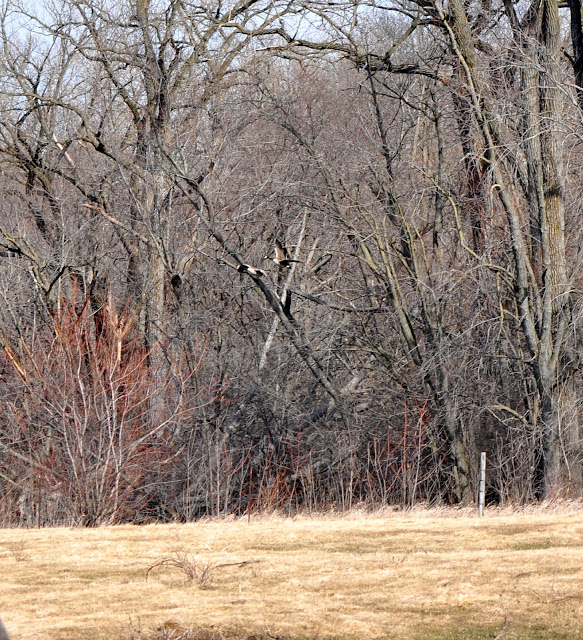There's the female and she is looking right at me.
Then she looks away. Finally she may have gotten used to me being across the field and has realized I'm not going to go any closer.
She's going to be here for awhile so I head to check the Red-tailed Hawk nest down the way.
No hawks on the nest yet of course but I do think there has been a little work done on it since I last saw it.
Next the conservation area...
More Canada Geese have arrived and there is a pair of Sandhill Cranes. The same pair as before who came in with a young crane?
No way to tell.
They give me a look.
 Then it is back to business. The female preens and the male forages.
Then it is back to business. The female preens and the male forages.The Sandhills preen and the geese remain vigilant. Currently Sandhill Cranes are not hunted in Wisconsin but geese are. Perhaps that has something to do with the difference in behavior. Perhaps not. I don't know.
The Cranes continue preening. They aren't paying the least bit of attention partially because, I assume, I've stayed in the car.
Then the lead geese begin to go forward slowly.
And the rest, both geese and cranes, follow, foraging as they go.
Honking ensues and a pair of flying geese appear out of the trees.
They fly over and some of the strolling geese begin going to the other side of the water with more purpose.
The Cranes preen....and keep preening.
How's that for neck action? She rubs the feathers on the back of her neck on her side. I'm always fascinated by the physical adaptations of birds. She can't reach the back of her upper neck with her beak. Nor would using her feet be particularly handy. And as her neck is capable of bending happily at a 45 degree angle she rubs it on her back.
Then some feather fixing on her right shoulder...
...and back to her head lying on her back.
Then when the female goes back to foraging the male begins to preen.
Then a Sandhill rattle call comes from the north. Loud! The cranes turn to look. The calls continue. I can't see anything through the trees and as a Sandhill rattle call can be heard from as far as 2 miles away who knows when something might actually appear.
The male Sandhill has left the water and walks a small way toward the sound and then stops. He watches.
The female comes out of the water as well.
We wait and watch the eastern sky. The rattle calls continue.
Eventually a third Sandhill appears above the trees on the edge of the Race.
And the original pair takes to their wings going north and land in a corn field adjacent to the conservation area.
The third crane keeps coming.
The third crane lands not far from the original pair.
Originally some days before I'd seen a threesome fly in as a group without issues. I had thought the third, might possibly be a colt from the previous year. Everything appeared quite familial. Which still could be the case, but looking at the positions of the two females things look a little hostile and perhaps the pair would like junior to buzz off and get a life. Or is this just an intruding female?
The pair takes off at speed and the third follows.
The pair has disappeared from my sight but the third is doggedly heading out after them.
And off the third goes after the pair.
Something just occurred to me. I haven't had extensive experience with cranes but previously if a crane called from a distance the ones in my view called back. It's a racket to wake the dead. The pair did not call back when the third called. Fascinating.
And the geese are left to their own devices.
Time to go and check out the Albany Bald Eagle Nest.
On the way a flock of Red-winged Blackbirds flew right in front of the car.
See. Red-wings.
Though some like the bird on the right, with their wings folded, looked a bit like feathered fish swimming through the air.
11:23 AM The Albany Bald Eagle nest.
11:23:07 And here is who I take to be Mom with her head decidedly turned away. I periodically take a picture just in case she turns.
11:25:26 There we go! She's looking well. She then turns her head and keeps it turned. I decide to try and make my way to the other side of the nest.
11:46:46 Not only did it take a bit to get to the other side of the nest, she's back lit and further away.
Oh well. Time to go look for Red-tailed Hawks!!!
More to Come!
Happy Hawking!
Donegal Browne



































No comments:
Post a Comment